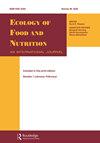食物、营养和健康模式的改变。
IF 1.7
4区 医学
Q4 NUTRITION & DIETETICS
引用次数: 0
摘要
本文章由计算机程序翻译,如有差异,请以英文原文为准。
Changing patterns of food, nutrition, and health.
Ecology of Food and Nutrition (EFN) promotes scholarly discussion and engagement on the holistic and cross-cultural dimensions of food and nutrition. Articles published in this journal focus on foods and food systems in terms of their utilization to satisfy human nutritional needs and improve health and well-being. The journal also publishes articles that examine how ecological, social, and cultural factors influence food availability, choices, and consumption, food cultures, and nutrition. Only a handful of journals publish articles that explicitly address the intersections of food and nutrition, biology and culture, and policy and practice from a holistic and global perspective. It is this kind of scholarship that EFN seeks to promote. The current issue of EFN includes eight articles based on studies conducted in Brazil, Côte d’Ivoire, El Salvador, Ethiopia, Haiti, India, Kenya, the Mediterranean Islands, the Republic of Palau, and the United States. These articles focus on a range of topics, including household food insecurity, prenatal maternal health, child nutrition, changing food consumption patterns, and determinants of dietary awareness and food behavior. The article by Pedrero-Tome and colleagues presents the results of a crosssectional study exploring the relationship between household food insecurity and the nutritional status of schoolchildren in rural El Salvador. The authors used the Food Security Perception Survey to collect data on 143 households and performed anthropometric measurements in a sample of 334 schoolchildren. The authors report that anthropometric failure was observed in nearly 38% of the schoolchildren and nearly 59% of the sample households experienced food insecurity. In their article, Suri and colleagues present the results of a cross-sectional study on the socio-demographic determinants of nutritional status in preschool children (3–6 years) in north India. The authors collected data using a 24-hour dietary recall and food frequency questionnaire (FFQ) and anthropometric measurements on a sample of 350 preschoolers. The results of this study suggest that the majority of children consumed less than 60% of the nutrient intake recommended by the World Health Organization (WHO). Furthermore, family income, the number of siblings, and birth order were associated with dietary insufficiency, and stunting and wasting were more prevalent among girls as compared to boys. The article by Owens and colleagues focuses on examining the relationship between cultural context and food consumption. The authors used cultural consensus analysis – a method commonly used to determine shared ECOLOGY OF FOOD AND NUTRITION 2022, VOL. 61, NO. 2, 125–127 https://doi.org/10.1080/03670244.2022.2041297
求助全文
通过发布文献求助,成功后即可免费获取论文全文。
去求助
来源期刊
CiteScore
3.50
自引率
0.00%
发文量
23
审稿时长
>12 weeks
期刊介绍:
Ecology of Food and Nutrition is an international journal of food and nutrition in the broadest sense. The journal publishes peer-reviewed articles on all aspects of food and nutrition -- ecological, biological, and cultural. Ecology of Food and Nutrition strives to become a forum for disseminating scholarly information on the holistic and cross-cultural dimensions of the study of food and nutrition. It emphasizes foods and food systems not only in terms of their utilization to satisfy human nutritional needs and health, but also to promote and contest social and cultural identity. The content scope is thus wide -- articles may focus on the relationship between food and nutrition, food taboos and preferences, ecology and political economy of food, the evolution of human nutrition, changes in food habits, food technology and marketing, food and identity, and food sustainability. Additionally, articles focusing on the application of theories and methods to address contemporary food and nutrition problems are encouraged. Questions of the relationship between food/nutrition and culture are as germane to the journal as analyses of the interactions among nutrition and environment, infection and human health.

 求助内容:
求助内容: 应助结果提醒方式:
应助结果提醒方式:


